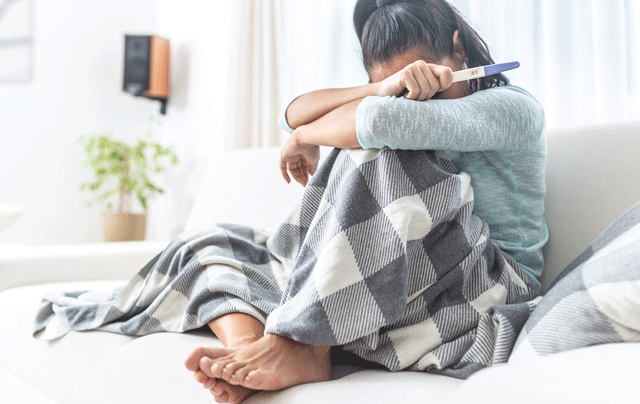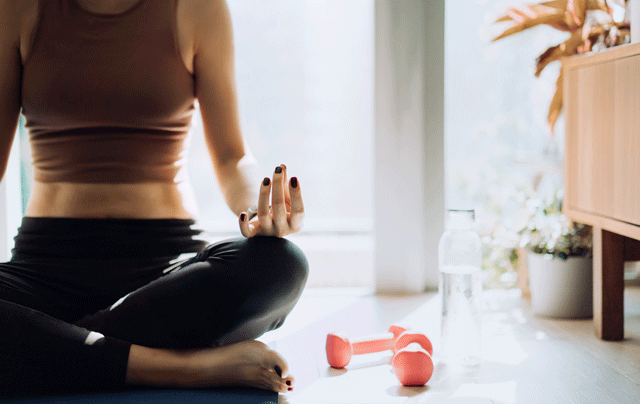Can anxiety stop you getting pregnant? The truth according to the experts
Can anxiety stop you getting pregnant? It won't help, but don't worry. Here's why anxiety can affect your abililty to conceive and what you can do about it.

Can anxiety stop you getting pregnant? Here's why anxiety can affect your ability to conceive and what you can do about it.
Trying for a baby should be a joyous time in your life, and there are numerous ways to increase your fertility so you can reach the best possible outcome.
However, if you're struggling to conceive you may feel increasingly anxious. Or, what if you are already anxious when you start trying for a family? We asked experts in fertility 'Can anxiety stop you getting pregnant?' and here's what they told us:
Can anxiety stop you getting pregnant?
Although there is little doubt that infertility causes stress 'what current research tells us is that stress doesn’t impact fertility, although there is still so much we don’t know about stress and fertility,' says Kate Davies, an independent fertility nurse consultant and director of Your Fertility Journey.
It might surprise you that stress doesn't impact fertility and anxiety doesn't stop you getting pregnant. But Kate says: 'We know this because war-torn countries and those with low economic poverty have some of the highest birth rates.'
'However, it’s what we do when we’re stressed – such as smoking, drinking alcohol and comfort eating – that can impact our fertility,' she warns. More about that later...
'Anxiety cannot stop women from getting pregnant, but it may make trying for a baby more difficult,' explains Dr Kalanit Ben-Ari, a psychologist, author and founder of parenting community, The Village. Indeed, there is some indication that anxiety can affect how long it takes to get pregnant.
Parenting advice, hot topics, best buys and family finance tips delivered straight to your inbox.

The science between stress and fertility
Studies show that the jury is out when it comes to a direct link between anxiety and being unable to get pregnant. While stress hormones can have a negative effect on hormone levels and the menstrual cycle, with one study suggesting that a reduction in anxiety can increase pregnancies, other studies haven't found a strong enough connection between anxiety and infertility.
'Conceiving comes down to a combination of many factors; some physical and others mental,' says Dr Ben-Ari. 'Stress and anxiety can have a negative impact on fertility. When we are stressed our nervous system is tense and defensive. This isn't the ideal for the process,' she says. However, it's highly unlikely that stress can render us infertile.
'Both the mind and body benefit from being relaxed and calm when it comes to fertility. They need to be open and receptive in order to allow for the egg to be fertilised,' continues Dr Ben-Ari. 'When we are stressed, the sympathetic nervous system is activated and directs the body's rapid involuntary response in order to manage stressful situations. This includes a physical reaction that is not in line with the body's need for being receptive and open during this time.'
On the other hand, one study found that depression, and the drugs taken to treat it, "may play an important role in the pathogenesis (development) of infertility." However, anxiety and depression are different conditions and should be treated as such.
How can you tell if you’re anxious?
'Symptoms of anxiety can be very different from one woman to the next,' says Kate. 'Common signs include a racing pulse, poor sleep, feeling overwhelmed, comfort eating or poor appetite, and shortness of breath,' she explains.
Other mental symptoms of anxiety include a feeling of dread, restlessness and irritability. Anxiety can also manifest itself physically as tiredness, dizziness, and aches and pains.
'Whilst feeling anxious may not directly impact fertility, we know that feeling anxious is a horrid place to be,' she adds. 'Many women feel like life is on hold and that they’ve lost control.'

What to do about anxiety if you’re trying to get pregnant
'If you're feeling anxious, be your own barometer of stress three times a day,' advises Dr Ben-Ari. 'Ask yourself what your anxiety level is between 1-10 (One being the lowest and 10 being the highest level of anxiety). If the number is high, do what you need to do in order to ground yourself. For some, it's a walk in nature, for others a relaxing soak in the bath, a hug from a friend, meditation or exercise,' she says. 'And practice mindfulness when needed.'
Breathing exercises for anxiety can be particularly helpful, as can other natural remedies for anxiety and ways to relax, including yoga – which is brilliant at promoting calm as well as strength – meditation, listening to gentle music, taking a magnesium supplement or bathing in transdermal magnesium, which is absorbed through the skin (try BetterYou's Magnesium Flakes, £9.95 for 1kg).
It also really helps to sip chamomile or lemon balm tea throughout the day, and get enough sleep. Some people swear by scented pillow sprays, as well as weighted blankets, which are thought to apply pressure, like a hug, that releases the feel-good hormone serotonin into our system.
Here's what to avoid if you're anxious:
- Smoking: the NHS states that smoking has been shown to make anxiety worse. Stopping smoking may help reduce your anxiety. This info should help you quit.
- Caffeine: caffeine is a stimulant that speeds up your heart rate and can affect your quality of sleep.
- Alcohol and recreational drugs: alcohol and certain street drugs such cocaine have a stimulating effect, which can increase anxiety.
- Junk food: a poor diet has been increasingly linked to poor mental health. One US study found that "California adults who consumed more unhealthy food were also more likely to report symptoms of either moderate or severe psychological distress than their peers who consume a healthier diet."
- Comfort eating: this can make you gain weight, which can affect your fertility.
- Stressful situations: reducing your workload; working from home if you have a difficult commute; and avoiding other anxiety-inducing situations will help you keep your anxiety under control while you're trying to get pregnant.
'The process of getting pregnant can be a very challenging and lonely experience. It's important to surround yourself with the right support. This could be peers in a similar situation, trusted family and friends, or a therapist. Work with your partner to support and raise each other up,' says Dr Ben-Ari. 'Being supported by, and feeling connected to inspiring people can make all the difference,' she says.
'I recommend seeing a fertility coach to work on your emotional health,' adds Kate. 'Start to live – and importantly – enjoy life whilst trying to conceive.'

Debra Waters is an experienced online editor and parenting writer. She also has a strong background on health, wellbeing, beauty, and food. She currently writes for Goodto and Woman&Home, and print publications Woman, Woman’s Own, and Woman’s Weekly. Debra has written for What to Expect, Everyday Health, and Time Out. In addition, she has had articles published in The Telegraph and The Big Issue.